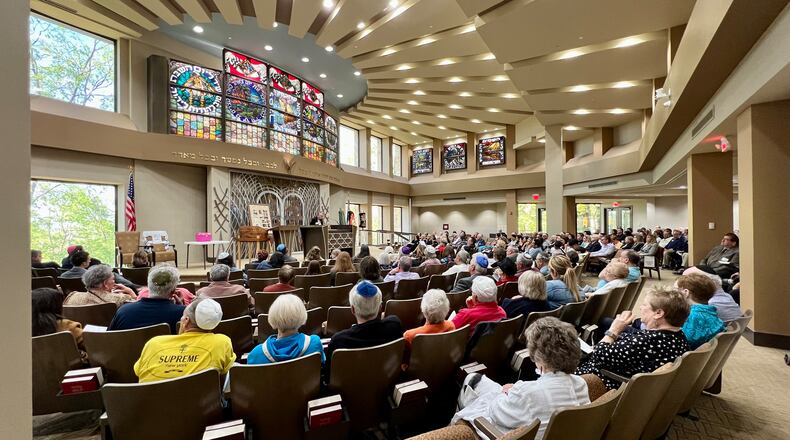“When this event first started, it was just a bunch of survivors,” said Renate Frydman, whose late husband survived the Holocaust. “At that time, most of the them didn’t even talk about what they went through; it took years, and some never talked about it.”
The annual Yom Hashoah Observance, a day of remembrance sponsored by the Jewish Federation of Greater Dayton’s Jewish Community Relations Council, was held Sunday at the Beth Abraham Synagogue in Moraine.
The event memorializes victims of the Holocaust and features speakers, prayer, and a chorale, as well as an art contest for local students.
Winners of the Max and Lydia May Writing & Art Contest were announced Sunday, with the winning pieces on display during the ceremony.
Created by students of varying ages, the art pieces showcase the emotion of Holocaust survivors and their families. One features a poem on a piece of paper with burnt edges, and another includes the line, “Never again, never forget.”
Sunday’s event came one day after a Miamisburg restaurant was forced to close because it was vandalized with swastikas and antisemitic language, and as the Anti-Defamation League tracks a huge increase in antisemitic incidents nationwide.
Rabbi Nochum Mangel spoke during Sunday’s ceremony, emphasizing the importance of remembering the Holocaust and preventing future atrocities.
“We know that remembrance is not enough, so today, we renew our sacred promise we make not only to the memories of those who perished, but to each other and to the world that never again will we allow the horrors of the Holocaust to be repeated anywhere,” Mangel said. “That promise demands action, courage, and vigilance.”
Dachau liberation
This year’s event also signified the 80th anniversary of the liberation of the Dachau Concentration Camp, which took place on April 29, 1945.
Elaine Buckler, whose late father Paul Buckler participated in the camp’s liberation, spoke about her dad’s experience Sunday.
“Dad didn’t talk about the war until the early 1990s when he saw a program on TV where they claimed the Holocaust never happened,” Buckler shared. “He was livid and said, ‘Elaine, people have to know what happened, even if it’s just you kids.’”
“So, he began to talk,” she said.
Buckler’s father was just 19 years old when he assisted in the Dachau liberation.
She shared a piece of writing from her dad, which offered a glimpse into his experience.
Below is an excerpt from Paul Buckler’s writing:
The railroad cars as we entered the camp were most striking, with about 1,500 dead bodies.
Three SS guards surrendered to me and a friend at this point, (and when) taking them to a compound, we passed the 1,000s of Jews and political prisoners in the camp.
The people in the camp began to shake their fists, spit and yell at the SS prisoners. We stopped and said, between us, how fitting it would be if we threw them into where the Jews and others were so unjustly kept. They would have taken them apart. But, we decided that would be as barbaric as the Germans.
... What a wonderful and thrilling experience to have helped someone under these conditions. Somehow, this made the very hardships of the war worthwhile.
About the Author



